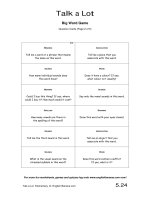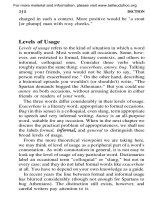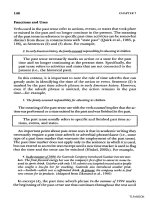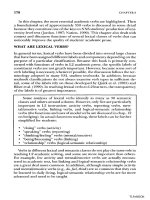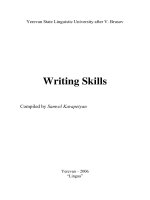Tài liệu Developing writting skills 2 part 2 docx
Bạn đang xem bản rút gọn của tài liệu. Xem và tải ngay bản đầy đủ của tài liệu tại đây (341.39 KB, 10 trang )
10
which should be mentioned only briefly, and which should be
excluded from the story altogether.
This selection is what distinguishes the good storyteller from
the bad one. The art consists in telling neither too much nor too little,
but just enough to do justice to both facts and feelings.
Making your stories lively, interesting and believable
Minor details
Carefully selected details, however minor they might seem,
contribute to the effect of the whole. For example, consider how
some of the drama of the narrative in “Man Overboard” disappears if
the detail about the mysterious green monster that turned out to be a
sleeping bag, or the even more mysterious, and frightfully more real,
monster that dragged it down is omitted. Such details are not
essential to the main line of the story, but each of them adds to its
concreteness and vividness and hence to its interest and
effectiveness.
Concrete verbs
One of the best ways to keep your readers’ interest and to
make your writing accurate and vivid is to use verbs effectively.
More than any other part of speech, verbs convey action. They tell
what happened.
Proper nouns
A good way to make your writing more interesting and
believable is to include proper nouns – names of specific persons,
places, and things – which will help readers feel they are
experiencing the story as they read it.
Direct Quotation
Using the exact words of a speaker also helps to make a story
seem real.
11
TEXT 1
Man Overboard!
By Thor Heyerdahl
Thor Heyerdahl’s narrative is part of a book
entitled “Kon – Tiki: Across the Pacific by Raft”.
But the episode forms one complete story:
1. ... On July 21 the wind suddenly died away again. It was
oppressive and absolutely still, and we knew from previous
experience what this might mean. And, right enough, after a few
violent gusts from east and west and south the wind freshened up to a
breeze from southward, where black, threatening clouds had again
rushed up over the horizon. Herman was out with his anemometer all
the time, measuring already fifty feet and more per second, when
suddenly Torstein’s sleeping bag went overboard. And what
happened in the next few seconds took a much shorter time than it
takes to tell it.
2. Herman tried to catch the bag as it went, took a rash step and
fell overboard. We heard a faint cry for help amid the noise of the
waves and saw Herman’s head and a waving arm as well as some
vague green object twirling about in the water near him. He was
struggling for life to get back to the raft through the high seas which
had lifted him out from the port side. Torstein, who was at the
steering oar aft, and I myself, up in the bow, were the first to
perceive him, and we went cold with fear. We bellowed “Man
overboard!” at the top of our lungs as we rushed to the nearest life-
saving gear. The others had not heard Herman’s cry because of the
noise of the sea, but in a trice there was life and bustle on deck.
Herman was an excellent swimmer, and, though we realized at once
12
that his life was at stake, we had a fair hope that he would manage to
crawl back to the edge of the raft before it was too late.
3. Torstein, who was nearest, seized the bamboo drum round
which was the line we used for the lifeboat, for this was within his
reach. It was the only time on the whole voyage that this line got
caught up. Herman was now on a level with the stern of the raft but a
few yards away, and his last hope was to crawl to the blade of the
steering oar and hang on to it. As he missed the end of the logs, he
reached out for the oar blade, but it slipped away from him. And
there he lay, just where experience had shown we could get nothing
back. While Bengt and I launched the dinghy, Knut and Eric threw
out the life belt. Carrying a long line, it hung ready for use on the
corner of the cabin roof, but today the wind was so strong that when
it was thrown it was simply blown back to the raft. After a few
unsuccessful throws Herman was already far astern of the steering
oar, swimming desperately to keep up with the raft, while the
distance increased with each gust of wind. He realized that
henceforth the gap would simply go on increasing, but he set a faint
hope on the dinghy which we had now got into the water. Without
the line, which acted as a brake, it would perhaps be possible to drive
the rubber raft to meet the swimming man, but whether the rubber
raft would ever get back to the Kon-Tiki was another matter.
Nevertheless, three men in a rubber dinghy had some chance; one
man in the sea had none.
4. Then we suddenly saw Knut take off and plunge headfirst into
the sea. He had the life belt in one hand and was heaving himself
along. Every time Herman’s head appeared on a wave back Knut was
gone, and every time Knut came up Herman was not there. But then
we saw both heads at once; they had swum to meet each other and
both were hanging on to the life belt. Knut waved his arm, and, as
the rubber raft had meanwhile been hauled on board, all four of us
took hold of the line of the life belt and hauled for dear life, with our
eyes fixed on the great dark object which was visible just behind the
two men. This same mysterious beast in the water was pushing a big
greenish-black triangle up above the wave crests; it almost gave Knut
a shock when he was on his way over to Herman. Only Herman
knew then that the triangle did not belong to a shark or any other sea
monster. It was an inflated corner of Torstein’s water-tight sleeping
13
bag. But the sleeping bag did not remain floating for long after we
had hauled the two men safe and sound on board. Whatever dragged
the sleeping bag down into the depths had just missed a better prey.
5. “Glad I wasn’t in it,” said Torstein and took hold of the
steering oar where he had let it go.
6. But otherwise there were not many wisecracks that evening.
We all felt a chill running through nerve and bone for a long time
afterward. But the cold shivers were mingled with a warm
thankfulness that there were still six of us on board.
Explain what is meant by:
1. It was oppressive and absolutely still and we knew from previous
experience what this might mean.
2. Herman tried to catch the bag as it went, took a rash step and fell
overboard.
3. The others had not heard Herman’s cry because of the noise of
the sea, but in a trice there was life and bustle on deck.
4. Then we suddenly saw Knut take off and plunge headfirst into
the sea.
5. Whatever dragged the sleeping bag down into the depth had just
missed a better prey.
QUESTIONS FOR STUDY AND DISCUSSION
1. Point out the role of the setting in the story. What mood does it
create? How does it contribute to creating suspense?
2. Point out the inciting incident that gave rise to the further
actions.
3. Discuss why or why not “Then everything began to happen fast”
would have been preferable to “And what happened in the next
few seconds took a much shorter time than it takes to tell it”
(Paragraph 1, last sentence).
4. Point out the details that would be omitted if the story were told
from the point of view of Herman (Knut, Torstein).
14
5. Comment on the structure of the sentence “Nevertheless, three
men in a rubber dinghy had some chance; one man in the sea had
none” (Paragraph 3).
6. Find the climax of the story. Account for your choice.
7. Some sentences or words were probably uttered during the
incident? Why do you think Heyerdahl chose to include only
Torstein’s remark (Paragraph 5)?
8. Try to find a phrase or sentence that sums up each of the six
paragraphs. These “titles” for the different parts of the narrative
should suggest the relationship between them.
9. Write out some verbs that the author has employed to make his
writing concrete, accurate and expressive.
EXPAND YOUR VOCABULARY
Match the words in Column A with their definitions in Column B
A B
1) oppressive a) to pull sth/sb with a lot of
effort
2) to perceive b) filled with gas or air
3) in a trice c) busy and noisy activity
4) inflated d) (of the weather) extremely hot
and unpleasant and lacking fresh
air
5) prey e) very quickly or suddenly
6) gust f) a sudden strong increase in the
amount and speed of wind that is
blowing
7) bustle g) to lift, pull or throw sb/sth
very heavy with one great effort
8) to heave h) a person who is harmed or
deceived by sb, especially for
dishonest purposes
9) to haul i) to notice or become aware of
sth
